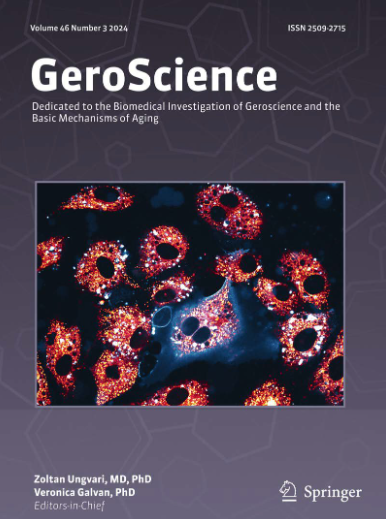肌脑相声是衰老过程中大脑健康的驱动因素。
IF 5.4
2区 医学
Q1 GERIATRICS & GERONTOLOGY
引用次数: 0
摘要
老年人的认知障碍和痴呆是重大的全球健康挑战。虽然身体机能和大脑健康之间的双向关系已经确立,但这种联系的机制驱动因素仍然知之甚少。肌肉的功能和质量是身体功能的核心,肌肉分泌组因其对全身健康的影响而日益被认识到——支持肌肉与大脑之间的潜在相互作用。第三届国际脑健康研究研讨会探讨了这一概念,该研讨会由温哥华海岸健康中心和不列颠哥伦比亚大学联合主办。我们介绍了本次研讨会的研究结果,从多个角度回顾了肌肉-脑串扰的文献现状,从人口研究到临床前模型。一个关键的焦点是肌肉分泌组,特别是肌因子和细胞外囊泡,作为影响大脑健康的潜在信使。研讨会还确定了关键的结论,并提出了下一步进一步阐明肌肉-脑串扰的潜在机制,并探索如何通过运动或药物干预来利用这些途径促进老年人的大脑健康。本文章由计算机程序翻译,如有差异,请以英文原文为准。
Muscle-brain crosstalk as a driver of brain health in aging.
Cognitive impairment and dementia in older adults represent significant global health challenges. Although the bidirectional relationship between physical function and brain health is well established, the mechanistic drivers of this link remain poorly understood. Muscle function and quality are central to physical function, and muscle's secretome is increasingly recognized for its systemic health effects-supporting the potential for muscle-to-brain crosstalk. This concept was explored at the 3rd International Research Symposium on Brain Health, jointly hosted by Vancouver Coastal Health and the University of British Columbia. We present the findings of this symposium, which reviewed the current state of the literature on muscle-to-brain crosstalk from multiple perspectives, spanning population studies to preclinical models. A key focus was the muscle secretome, particularly myokines and extracellular vesicles, as potential messengers influencing brain health. The symposium also identified critical takeaways and proposed next steps to further elucidate the underlying mechanisms of muscle-to-brain crosstalk and explore how these pathways might be harnessed through exercise or pharmacologic interventions to promote brain health in older adults.
求助全文
通过发布文献求助,成功后即可免费获取论文全文。
去求助
来源期刊

GeroScience
Medicine-Complementary and Alternative Medicine
CiteScore
10.50
自引率
5.40%
发文量
182
期刊介绍:
GeroScience is a bi-monthly, international, peer-reviewed journal that publishes articles related to research in the biology of aging and research on biomedical applications that impact aging. The scope of articles to be considered include evolutionary biology, biophysics, genetics, genomics, proteomics, molecular biology, cell biology, biochemistry, endocrinology, immunology, physiology, pharmacology, neuroscience, and psychology.
 求助内容:
求助内容: 应助结果提醒方式:
应助结果提醒方式:


